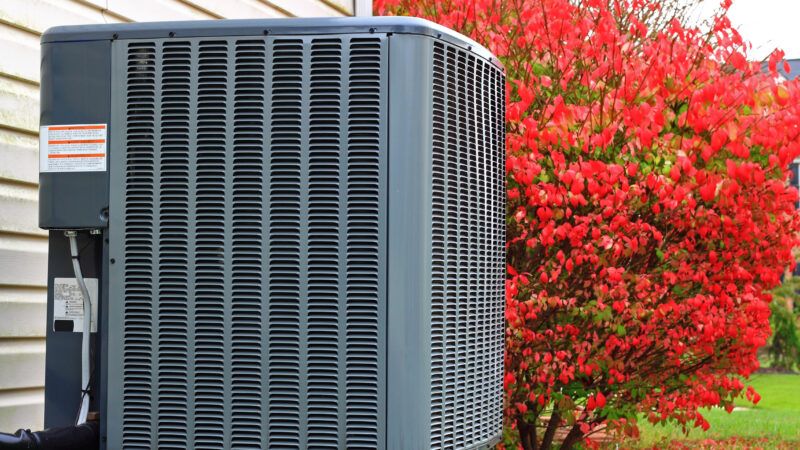Afraid of Rising Global Temperatures? Ditch Your Air Conditioner, Suggests New York Times Essay.
Depriving yourself of a modern luxury like air conditioning makes even less sense than banning plastic straws.

In a guest essay in The New York Times, Stan Cox of The Land Institute made the case for swearing off air conditioning to lessen the severity of climate change. It sounds like a miserable way to live—and thankfully, there are better ways to accomplish the same goal.
"The greenhouse gases created by the roughly 90 percent of American households that own A.C. units mean that running them even in balmy temperatures is making the climate crisis worse," Cox writes. Further, "air-conditioning has altered the way most Americans experience heat. Our bodies have grown so accustomed to climate-controlled indoor spaces, set at a chilly 69 degrees, that anything else can feel unbearable."
Despite living in Kansas, Cox says he has lived most of his life without air conditioning, making only a handful of exceptions each year during heat waves or when having guests over.
"We rely on electric fans, which consume only about 2 percent of the energy needed to air-condition one room," he writes. "We also kept other appliances and devices turned off as much as possible because they, too, generate heat." He and his wife don't have a dishwasher, they dry their laundry on a clothesline, and they keep the refrigerator "set for just under 40 degrees, the highest safe temperature, according to the Food and Drug Administration."
From there, his methods veer into the absurd: "When it gets too hot, we lightly spray water on our arms, legs and faces; the water helps dissipate a lot of heat. A quick, cold shower or a little time spent with that all-American favorite, the lawn sprinkler, also can bring relief."
In fairness, Cox admits that this is not an option for everyone, at all times. "If you live in Miami or Phoenix, you need air-conditioning to survive the summer," he says. "But if you live in the middle of the country, try leaving the air-conditioning off when it's hot but not too hot."
And his methods are paying off financially: "Our June electric bill informed us that we'd used 80 percent less electricity than other homes in our town with similar (in our case, modest) square footage."
If anybody values their pocketbook that much more than a bare minimum of livable comfort, then by all means, do as he suggests. But it would be foolish to recommend this as a feasible plan for the average person or to suggest that it is necessary to stave off climate change.
While 90 percent of American households have an air conditioner, the overwhelming majority of its direct greenhouse gas emissions come from transportation and electricity production. Air conditioning accounts for around 3 percent of global greenhouse gas emissions. Simply put, it matters much less how often and at what temperature we run the thermostat than how we create the vast majority of our electricity in the first place.
To that end, switching to nuclear energy would be a tremendous advantage. "Every year, nuclear-generated electricity saves our atmosphere from more than 440 million metric tons of carbon dioxide emissions that would otherwise come from fossil fuels," according to the Nuclear Energy Institute. "That's the same as taking nearly 100 million passenger vehicles off the road." The International Atomic Energy Agency claims that "the use of nuclear power has reduced carbon dioxide emissions by more than 60 gigatonnes over the past 50 years, which is almost two years' worth of global energy-related emissions."
In that sense, spraying yourself with water instead of running the air conditioner makes as much sense as banning plastic straws. Straw bans were once touted as a meaningful step toward eradicating plastic pollution, even getting companies like Starbucks to shift away from plastic straws.
But "despite the concerted efforts by corporations, the plastic straws ban has only made a minor difference in plastic waste production," wrote Owen Mulhern at Earth.org. "National Geographic reveals that where 8 million tonnes of plastics flow into the ocean every year, plastic straws merely comprise 0.025% of the total. The finding indicates that banning plastic straws could not make a significant improvement to the environment."
Depriving oneself of a modern luxury like air conditioning actually makes even less sense than banning plastic straws, because as Cox notes, air conditioning can literally save lives.
This isn't to say that we shouldn't embrace alternatives when it makes sense: As someone who works in a poorly-insulated bonus room above a garage in the southern United States, I use an air-circulating fan to make the temperature more bearable. While not perfect, it's cheaper than redoing insulation or adding a second thermostat for a single room. But that's just one small change, made out of necessity, that has no effect whatsoever on global greenhouse gas emissions.
If people are sufficiently worried about climate change to deprive themselves of a modern luxury like air conditioning, then they're certainly free to do so. But we shouldn't expect it to make a difference, and we should be thankful that it's not our only option.


Show Comments (118)